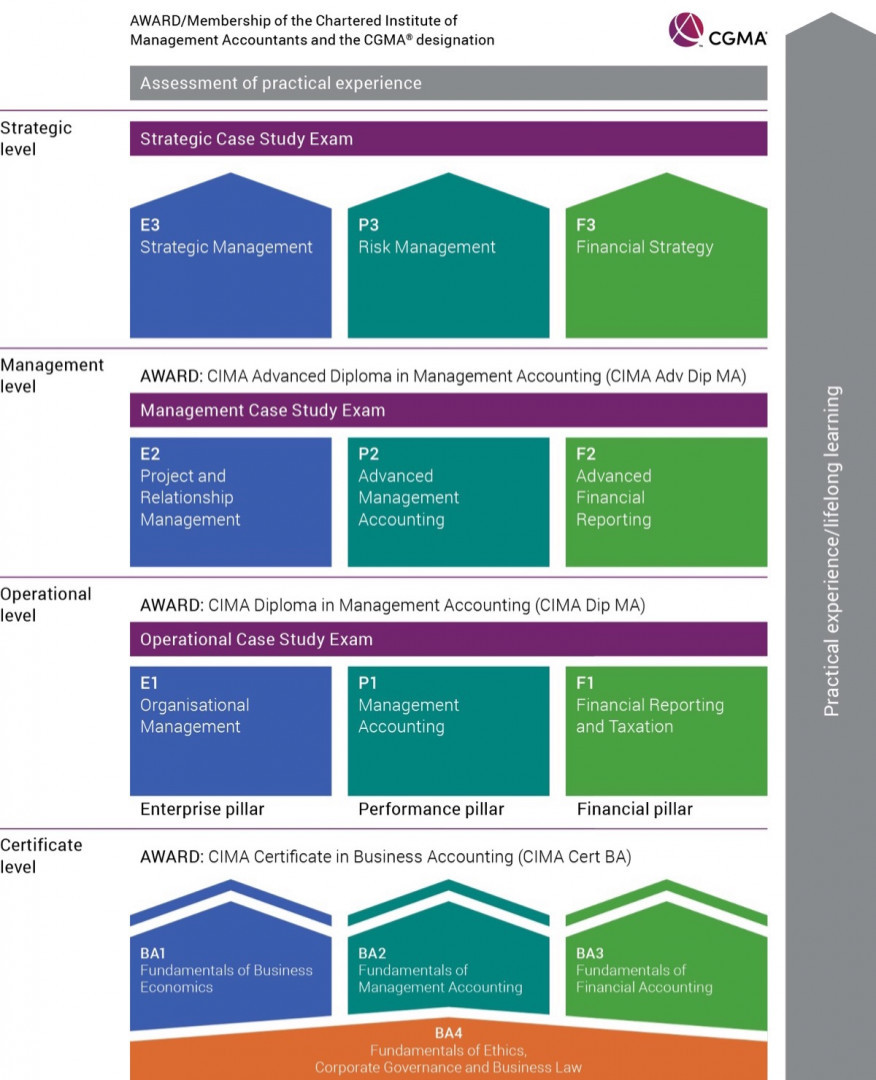Forgot Your Password?
Just enter your account email here
to have the password sent to your email.
This is the second level of the Professional Qualification and consists of three computer based Objective Tests and one Case Study.
The Management level focuses on translating long term decisions into medium term plans. Candidates will be able to use data and relevant technology to manage organisational and individual performance, allocate resources to implement decisions; monitor and report implementation of decisions; as well as prepare and interpret financial statements to show performance. On completion, you receive the CIMA Advanced Diploma in Management Accounting (CIMA Adv Dip MA).
After passing all four exams, you are awarded with the part-qualified designatory letters ‘CIMA Adv Dip MA’ and are ready to embark upon your Strategic Level journey.
P2 Advanced Management Accounting
F2Advanced Financial Reporting
management level CASE STUDY
You may qualify for exemptions which let you start your studies at a level that is consistent with the knowledge and skills gained from prior learning. They provide you with the quickest route to CIMA membership.
Click below to establish any exemptions you may be awarded along with further important dates and CIMA information.
Don't Forget! As part of your journey to become an CIMA member, you must demonstrate relevant skills and experience within a real work environment. This is what CIMA'S Practical Experience Requirement (PER) is all about.
To complete CIMA and gain membership you will need to achieve a minimum of 36 months’ experience across the four knowledge areas, with a maximum of 60 months to be evidenced.
Download the per guide
Syllabus structure
The syllabus comprises the following topics and weightings:
A. Financing capital projects: For selected strategic (capital investment) projects to be implemented, funds must be sourced at the right cost and at the right time. This is a key role of the finance function and shows how it enables the organisation to create value. This section looks at the sources and types of funds and how much they cost.
B. Financial reporting standards: The finance function is responsible for narrating how organisations create and preserve value. Different types of narratives are used for different audiences. Financial reporting is used for external stakeholders. This section examines the building blocks for constructing the narratives in the financial statements. It covers the key financial reporting standards on which the financial statements will be based.
C. Group accounts: Organisations sometimes acquire or merge with other organisations to improve their strategic performance, position and prospects. The performance and position of combined operations are reported through group accounts. This section covers the application of the relevant financial reporting standards to prepare group accounts. The topics covered are those that are essential to conducting conversations with different parts of the business about the performance of the group and its component parts.
D. Integrated reporting: In a multi-stakeholder world, there has been a call for broader forms of reporting to cover wider audiences and issues of concern to them. The International Integrated Reporting Framework developed by the International Integrated Reporting Council (IIRC) is one of the most influential frameworks that seeks to fulfil this role. This section introduces candidates to the Framework and its components.
E. Analysing financial statements: The analyses of financial statements enable organisations to explain their performance and to compare their performance and prospects over time and against others. It can show how vulnerable they and their business models are to disruption. This section shows how these analyses are conducted and their limitations.
EXAM FORMAT
READY TO MAKE A START with rca?
Step right in and start your CIMA & RCA journey. RCA run all courses twice yearly to help keep you moving through the qualification with classes running during the spring and autumn terms for F2, on an evening and weekend basis.
INCLUDED IN YOUR F2 LIVE ONLINE/CLASSROOM COURSE
1. Face to face classes or login via the live stream, the choice is yours
2. 30-36 Hours of lectures from subject specialist tutors
3. Exam question practice throughout
4. All classes are recorded and uploaded to your online account to recap and reinforce classroom learning
5. Can't make it to a class? No problem, just catch up via your online recording
6. All learning materials included (tutor course notes, Kaplan study text & exam kit)
7. Tutor support 24/7 via Email, What'sApp or Phone
8. What'sApp group support. with tutor updates with assignments pre & post class
9. Flexible payment terms available
10. Pass Guarantee...
CHECK OUT ALL F2 CLASS DATES AND PRICES HERE

Just enter your account email here
to have the password sent to your email.
This site uses essential cookies for parts of the site to operate and have already been set. Find out more about how we use cookies and how you may delete them HERE. You may delete cookies, but parts of the site will not work.
Input your email address and click the subjects you are interested in for free emails with study guidance, tips and other resources.